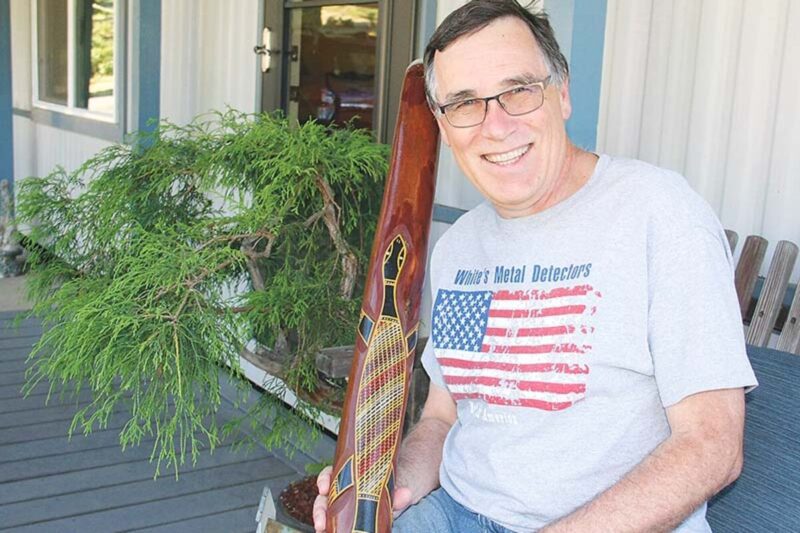Sean C. Morgan
Erik Duncan had never accepted a job that required an interview until last December.
That’s because he had never needed one.
In this case, the Murphy Company of Eugene had just completed its purchase of the plant from Weyerhaeuser and employees were interviewed and hired separately by the Murphy Company.
Duncan interviewed and accepted the job to finish out a 42-year career at the Foster’s Murphy Veneer that ended July 1.
Duncan said he has done “everything” at the mill.
“I started out on the graveyard green chain,” with Sam Galster, who recently retired after 45 years at the mill.
Duncan spent the next eight years working graveyard off and on, he said, and he moved through just about every position through the next 42 years.
“The best job I ever had was when we had the spindleless lathe,” which was installed in 2003, he said,
He worked alone, stacking 2-inch cores for four years, he said. When he wasn’t stacking, he worked all over the mill doing odd jobs.
“One year, they had a bunch of bigwigs coming in,” Duncan recalled. “They put four big plants out front. It was my job to water those every morning.”
That was Jerry Underwood’s idea – back before Weyerhaeuser took over Willamette Industries.
Duncan also spent 14 years working on the clipper in the green end, he said. For 14 years, he watched veneer go by.
Over four decades, he watched the business change from hands on to everything being automated, Duncan said, although Murphy is going back to some of the hands-on approach and will have people pulling green veneer.
“I worked a lot in ergonomics,” Duncan said. “I led the ergonomics team. At one point, we were best practices for (Weyerhaeuser).”
His team focused primarily on industrial hygiene, things like hearing protection and the work environment, he said.
Although he never used it in practice, “I went to smoke school to learn how to read smoke,” Duncan said. With that skill, employees can look at the emissions from the mill and know whether the plant is in compliance with industrial regulations. Several employees are trained for it, and Duncan was certified to read the smoke for three years.
He was head steward with the union for four years, and he was involved in hiring committees. He has been on strike three times, and he was laid off once that he can remember.
He rounded out his career driving a LeTourneau log stacker, unloading log trucks. The most trucks he and his crew unloaded in a day was 122.
Duncan moved to the area as a high school freshman. His father worked in fish passage research for the U.S. Army Corps of Engineers.
After graduating from Sweet Home High School, he attended the University of Oregon for a couple of years.
While in college, he worked for a couple of years as a shop aide for Bonneville Power Administration in The Dalles, washing cars and running parts.
Then he went to work at Foster in 1976 when his brother-in-law called him and asked if he wanted a job.
“That’s pretty much the only job I’ve ever done,” Duncan said. “Overall, it was a good place to work. I raised a family and got to do a lot of things outside of work I might not have been able to someplace else.”
Duncan spent years coaching local sports, and he has remained an active musician, serving as worship team leader at his church, Hillside Fellowship, where he has been a member for 39 years.
Duncan noted that Wes Collins, marketing director at Radiator Supply House, recently returned from a trip to Australia where he purchased a didgeridoo for Duncan.
Perhaps the roughest period in the industry was in the late 1980s with the listing of the northern spotted owl as endangered, leading to declines in the timber industry, steeply cutting the amount of logging around Sweet Home and ultimately closing down mills. Foster is the last of those in the Sweet Home area at the time.
“We were apprehensive because we knew our jobs depended on being able to sell products and the logs to do that,” Duncan said. At the time, the Foster mill was putting out sheeting and floors by the box car load.
Other factors, like strand board and engineered wood products, also affected the industry, he said. Over the years, he still runs into people around town who worked at the old mills.
“We hired a lot of those people.”
They might have spent 20 years somewhere else, and then they worked at Foster another 20 years, Duncan said. A lot of people in the industry in the 1980s and 1990s finished out their careers at Foster.
“We always considered ourselves fortunate,” Duncan said. Willamette Industries and Weyerhaeuser always did what they needed to keep that mill open.
Still, he never thought – until he had been there 30 years – that he he’d be there “forever.”
At this point, Duncan plans visit his daughter, Theresa “T.J.” Duncan, an interior designer, and her husband, Jamie Knott, in South Carolina where Theresa is having her first baby and then to take it easy until the first of the year.
He will stay busy with his hobbies, his music and raising bonsai trees, which he has done for about 20 years.
Duncan lives off Pleasant Valley Road with his wife, Debbie Duncan. They have one adult son, Jason Duncan, living in the area. He is the section supervisor for Sweet Home in the Linn County Road Department. He and his wife, Misty, have two children, Ashley, 10, and Madison, 12.
“Forty-two years has gone by really quickly,” Duncan said, calling himself the last of his generation. “Right now, everybody’s retired that I started with. I don’t miss the work part of it, but I miss being part of that mill. I’ve helped it grow. I’ve watched it grow.”





